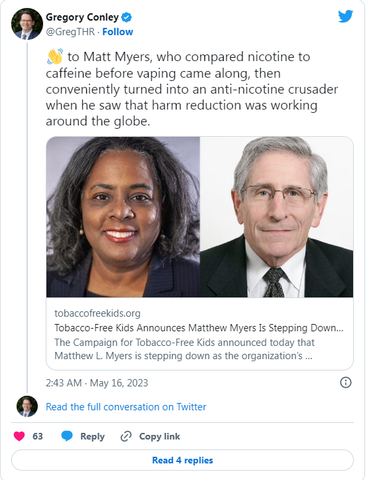
Anti-vaping leader Matthew Myers will step down as president of the Campaign for Tobacco-Free Kids on July 1. He will continue to advise the organization.
Myers has been involved in almost every major event in the tobacco control sphere since the 1980s. He has been instrumental in shifting tobacco control focus from battling with tobacco companies to blocking the adoption of vaping and other low-risk nicotine products.
He has created a fundraising juggernaut to finance the organization and spread his anti-tobacco gospel. In its most recent annual report, the Campaign for Tobacco-Free Kids (TFK) reported receiving about $40 million in grants and contributions during the previous year. Its lobbying arm the Tobacco-Free Kids Action Fund received almost $47 million.
Since 2019,TFK has managed grants from billionaire Michael Bloomberg to advocate for rules and laws intended to block uptake of vaping and other non-combustible nicotine products. TFK received a $160 million grant from Bloomberg Philanthropies in 2019 specifically designated to combat flavored vapes, and got another large grant in 2023.
The new TFK president will be Yolonda Richardson, currently TFK’s executive vice president of global programs. Richardson has overseen the organization’s international programs, which focus on low- and middle-income countries (LMICs). As a key partner in the Bloomberg Global Initiative to Reduce Tobacco Use, TFK’s international operation has advocated for bans and restrictions on vaping and other safer nicotine products, including in countries with high smoking rates. Richardson will also run the Action Fund.
Myers’ compromises with the tobacco industry
During Myers’ reign, TFK has become a powerful force behind legislation blocking access to non-combustible nicotine products. He has been instrumental in creating a moral panic over teenage Juul use, and has largely coordinated the spread of misinformation that prevents many people who will die from smoking from switching to e-cigarettes.
A former congressional staffer himself, Myers has cultivated strong relationships with D.C. politicians and the media, and has made himself the go-to source for advice or explanation of all tobacco- and vaping-related issues. It is probably not an exaggeration to say that no regulation or legislation that has made it more difficult for smokers to switch to low-risk nicotine products has been considered or passed without the input and final approval of Matthew Myers.
Myers founded TFK (then called the Center for Tobacco-Free Kids) in 1996 with funding from the Robert Wood Johnson Foundation (begun by heirs to the Johnson & Johnson pharma fortune), American Cancer Society, American Heart Association, and American Medical Association.
Myers twice played a crucial role negotiating compromises with major tobacco companies—first helping develop the 1998 Master Settlement Agreement, and later the 2009 Family Smoking Protection and Tobacco Control Act (TCA).

To create the MSA, Myers and state attorneys general engaged in secret negotiations with lawyers from the tobacco industry to set up a system of perpetual annual payments to the states based on tobacco sales.
The TCA granted the FDA authority over tobacco products, creating the agency’s Center for Tobacco Products, which was largely staffed by people aligned with Myers’ supposed mission to reign in tobacco companies. In reality, since passage of the TCA, the major tobacco companies have destroyed or bought out smaller competitors and consolidated their market power.
The TCA, which was signed into law by President Obama in 2009, was co-written and supported by cigarette giant Philip Morris (later called Altria). The law grandfathered onto the market all cigarettes and tobacco products available in February 2007, but set up a difficult pathway to FDA approval for low-risk, non-combustible products that came after that. One U.S. senator referred to the legislation as the “Marlboro Protection Act.”
Vaping sounded good to Myers—before it actually existed
Before passage of the TCA, Myers said he didn’t oppose low-risk nicotine products that would compete with cigarettes in the marketplace and displace smoking. In 2006, as negotiation of the legislation neared an end, he told the New York Times that non-combustible nicotine products wouldn’t pose a more serious health threat than coffee.
“The challenge to me is not to eliminate smoking, but the death and disease from smoking,” Myers told columnist Joe Nocera. “That should be the end goal. If you had a product that addicted 45 million people and killed none of them, I would take that deal. Then you’d have coffee! I have to believe that if the marketplace incentives were such that over time someone could devise a product that would give the same satisfaction as tobacco but didn’t kill them, people would flock to it.”
He changed his tune once those products appeared and consumers began flocking to them. Since the advent of vaping, Myers has consistently opposed the practice, arguing in favor of flavor bans and other restrictions in the United States, and outright prohibition in LMICs like India and Mexico. Myers has argued against all FDA authorizations of vaping products.
Myers’ retirement marks the second exit of a prominent anti-vaping tobacco control leader this year. In February, Truth Initiative CEO Robin Koval announced she would retire.
